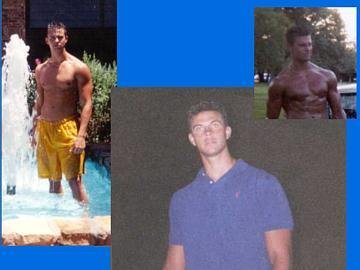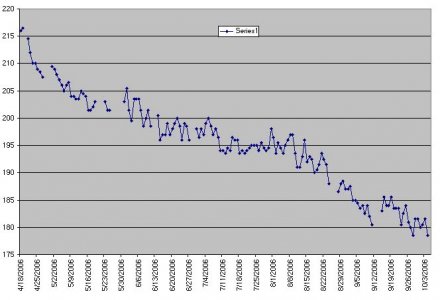Wow, talk about a topic that hits close to home, that I didn't really expect to be discussing with any of you folks...

I'm in a different position from most of you, being somewhat older (middle aged) and less active (not really interested in working out). What I've been fighting is a tendency to gradually gain weight over the years, an average of 2-3 pounds per year. I never really noticed it until I looked up and I was suddenly 20-30 pounds more than I was 10-15 years ago.
During that time, I've occasionally been on crash diets, dropped 10-15 pounds, and gained it all back again in a few months. I now attribute that to a bad way of thinking: "I've accomplished my weight loss, now I can eat anything I want again". I now realize that I can't think that way any more. I am finally resigned to considering myself on a weight loss regimen for the rest of my life. It will be stricter when I still need to lose weight, but even once I get my weight down to where I want it to be, I am planning to stay there by thinking that I still need to watch my weight, and avoiding that way of thinking. I may engage in an occasional splurge, but it will be a single meal here or there or an occasional treat - no more thinking that I can just stop watching what I eat, ever again. I may or may not succeed, but at least, this is what I am planning and hoping to accomplish.
I think you really need to figure out what works for you to lose weight. You need to understand what you eat, when you eat, why you eat. The reasons and so forth are going to be very different from one person to another. I won't speculate on anyone else's reasons for eating. All I can tell you is about myself.
I love food. I really do. I love going to the finest restaurants, I love many different kinds of food, I love snacking and junk food and desserts. I tend to eat when food is in front of me. If there's food around the house (ready to eat), I'll eat it. If I'm around food out of the house, I'll eat it. So much of my own battle is fought at the grocery store, the first line of defense, as well as not eating out any more than I have to.
I've come to realize that I don't eat just because I'm hungry. I would have to eat nothing (other than liquids) for about three days straight before I really start feeling any physical sensation of hunger. The rest of the time, when I "feel hungry", it's not a physical feeling due to lack of food inside me; it's a psychological dependency, one that pops up just a few hours after I eat. THAT'S what I need to conquer. Realizing that it's entirely psychological is a big help, because I know that it's not true hunger, it's more like an addiction.
The ways of losing weight are going to be very different, too. For example, I know that I can lose weight by doing what most experts recommend NOT doing - skipping meals. That's what works for me. I don't care if they tell you to eat three healthy meals a day, I just can't lose weight by doing it. I've been able to take weight off by skipping breakfast and lunch, and then for dinner, usually eating not a whole lot and/or only healthy items (except on occasions where I'm getting together with people). I'm not recommending this to anyone else, only noting that it seems to work for me, and if you want to lose weight, you have to figure out what works for you.
About four months ago, I reached my highest weight ever - 216 pounds on my 5'9" body. That may not sound like all that much - comparisons are relative, of course - but I looked (and still look)
fat. I started another crash diet at that time, and I have lost 25 pounds so far. I now weigh the lowest I've been in the past 14 years (since Dan Quayle was vice president

), so I've already accomplished a lot. If I can lose another 15 pounds, I will no longer look fat (I should probably lose 20 to look just right, but I'll settle for 15). That's what I'm trying for (and I can't stress enough, it's just as important for me to stay there once I get there). If I get there, I'll update the chart in this post.
I haven't really followed a structured diet at all; I'm not counting calories or carbs, for example. But let's face it, we all know what foods put on weight - fats and carbs. I've tried to avoid both in order to lose weight. If you eat grilled fish and steamed vegetables, you're not going to put on weight, no matter whose diet you're talking about. I'm not against counting calories or carbs, just noting that a general awareness will often do. I'm usually pretty good at knowing what's good and what's bad, although I am occasionally surprised (like when I checked and discovered that a small 16 oz "low fat" shake at McDonald's has about the same number of calories as a Big Mac and more than twice the carbs - ice cream in general is a surprising killer). Oh, and beware the labeling of many foods. Many foods are labeled "low fat" but have tons of carbs, many others are labeled "low carb" but have tons of fat. When I'm being good, I avoid both. As I see it, I can eat half a head of cauliflower, steamed, and it's a whole lot better for me than those smallish "Lean Cuisine" entrees which have a smidgeon of protein (meat or fish) but served over a starch - not many calories but 40+ grams of carbs. I think it's important to realize what foods you can eat and enjoy without putting on weight (again, for me, grilled fish and steamed vegetables, and also salads, although salad dresssings and certain ingredients often make salads less weight-reducing than the category connotes), what foods will put on weight but you can do without (for me, beef and anything fried), and what foods you simply adore and need to minimize your consumption except as an occasional treat/reward (for me, breads, cakes and other desserts, and worst of all, ice cream).
What helps? It helps me to weigh myself at the start of every day. I put it into a spreadsheet and can look at a chart (which, BTW, is how I know how much I've gained over the years). It helps me to end every day by thinking about
everything I ate during the day, and think about what I'm glad I ate and what items I regret eating. I drink lots of unsweetened or artificially sweetened liquids (diet sodas, diet iced tea) to keep myself feeling full.
I find it also helps to realize that when I eat too much for a day, it's not a reason for giving up; I can be good the next day and get right back into the swing of losing weight. Not that I want to be bad very often, but one day is not going to undo the success I've had. Better to fall down for a day and get right back up, than to use it as an excuse for gaining it all back.
Anyway, all of this is what has worked for me so far. I wish you all the best in your efforts.








